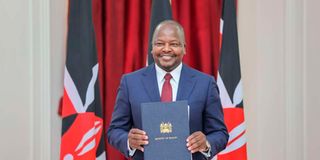Premium
Assure us of policy continuity

Health Cabinet Secretary Mutahi Kagwe on March 7, 2022 after Moderna and Kenya signed an MoU to establish a USD500 million vaccine manufacturing plant in the country.
One of the most popular topics of discussion in Nairobi’s diplomatic cocktail circuit today is the imminent presidential regime change and its likely impact on the economic policy environment in the medium term.
Foreigners with an interest in Kenya want a road map to show them what to expect when President Uhuru Kenyatta exits the scene in August.
As a veteran and regular newspaper commentator on economic issues, I have seen many presidential regimes come and go. I have witnessed newly elected presidents romping home and wasting no time in starting to stamp their fingerprints on crucial public policy questions of the day.
The common denominator through the regimes has been considerable continuity in direction of policy. When you analyse how policy-making has evolved over the years through changes in presidential regimes in Kenya, you will not see too much partisan competition and radical changes.
Indeed, the constant and common thread between presidential regimes has been the absence of wild swings and capricious alterations of plans and policies and that has been a very big national asset.
That explains the leap of faith American biotechnology giant and one of the biggest vaccine manufacturers Moderna Inc. took, defying uncertainties around the elections to sign the single-largest direct foreign investment deal in Kenya in years.
Memorandum of understanding
Moderna has entered into a memorandum of understanding with the government to establish a $600 million (Sh60 trillion) mNRA manufacturing facility in Nairobi. This is a big deal by any measure. Moderna plans to make Kenya its Africa operations hub and has also pledged to support our own Biovax Ltd, the state-owned company established recently to spearhead the country’s ambition of locally manufacturing vaccines.
Predictability, stability and continuity in policy and plans are critically important for an economy like ours. We need to entrench systems and traditions where sound plans and policies are made to transcend presidential regimes.
Even the most strident critic of President Kenyatta’s administration will agree that the Nairobi Metropolitan Services director-general,Major-General Mohamed Badi, has made remarkable achievements.
We all agree that Nairobi’s development agenda is much bigger than digging boreholes in informal settlements, building pedestrian walkways in the CBD, mobilising the National Youth Service in garbage collection, building hospitals in Korogocho and recovering stolen public land.
Bigger problems
The capital city’s bigger problems include major backlogs in investment in water supply, under-investment in markets, chaotic commuter services and dysfunctional traffic lights. But the reason Mr Badi has been widely celebrated is the passion and sense of urgency that his approach has introduced in the management of public affairs. Must we insist that NMS must go when President Kenyatta retires?
How about the ongoing reforms in the electricity sector, negotiations with independent power producers and ambition to bring consumer electricity prices down? Must the reforms be discontinued after President Kenyatta leaves State House? What is the fate of the turnaround of the Kenya Meat Commission by the military?
Many economic historians argue that President Mwai Kibaki did not embrace continuity in his approach to policy when he came to power in 2002. Yet what made his approach fresh was that he took over under a very different set of circumstances. There no major policy swings.
His administration came in to find an economy that had suffered years of under-investment. We were in the hands of an austerity junta that was running the economy to the dictates of the Washington Consensus wrapped in a document called the “Poverty Reduction Strategy Paper (PRSP)”.
Bitter pill
The difference between Kibaki and his predecessor, President Daniel arap Moi, was that he did not swallow the whole bitter pill root and branch. He just tinkered with the contents and changed the title of the book to “Kenya’s Economic Recovery Strategy Paper (ERS)”. He borrowed massively and almost tripled the budget on roads, free primary education and energy in the very first year of his administration.
One of his most dramatic decisions, in the very early days in office, through his Finance minister, the late David Mwiraria, was to reduce the cash ratio by a massive margin, the impact of which was a dramatic fall in the Treasury Bill (TB) rate. At one point, the rate tumbled to under one per cent.
Commercial banks found themselves in a position where they could no longer buy TBs profitably. They were forced to start learning how to lend money to the common man. And for the first time our banks were hawking consumer loans!
Economic policy must consistently project continuity of sound plans and policies. That is the message the presidential candidates must keep sending and projecting.





